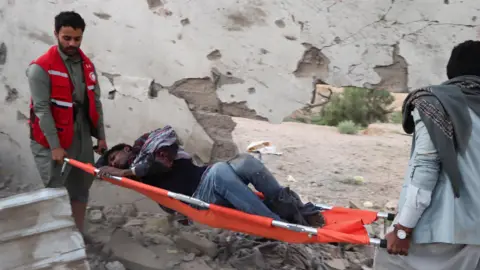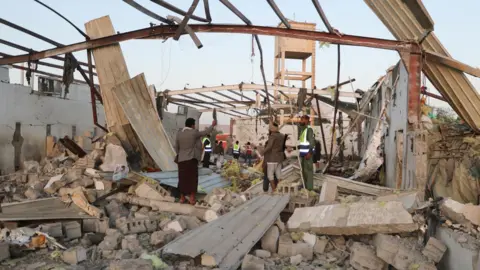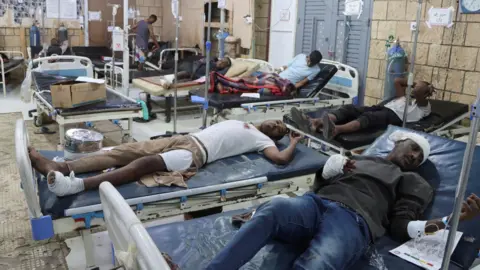Dozens of African migrants killed in US strike on Yemen, Houthis say
 Reuters
ReutersAt least 68 African migrants have been killed in a US air strike on a detention centre in Houthi-controlled north-western Yemen, the armed group's TV channel says.
Al Masirah reported that another 47 migrants were injured, most of them critically, when the centre in Saada province was bombed. It posted graphic footage showing multiple bodies covered in the rubble of a destroyed building.
A US defence official said the US military's Central Command was aware of the claims of civilian casualties.
The strike came hours after Central Command announced its forces had hit more than 800 targets since President Donald Trump ordered an intensification of the air campaign against the Houthis on 15 March.
It said the strikes had "killed hundreds of Houthi fighters and numerous Houthi leaders", including senior officials overseeing missile and drone programmes.
Houthi-run authorities have said the strikes have killed dozens of civilians, but they have reported few casualties among the group's members.
The migrant detention centre in Saada was reportedly holding 115 Africans when it was hit four times shortly before 05:00 local time (02:00 GMT) on Monday, according to Al Masirah.
The casualty reports could not be immediately verified, but Al Masirah's videos showed first responders recovering the bodies of at least a dozen men among pieces of concrete and metal debris on the floor of a large building with partially destroyed walls and no roof.
At a local hospital, another injured man told Al Masirah: "The strike hit us while we were sleeping, that's it."
Following a visit to the scene, the chairman of the Somali community in Yemen, Ibrahim Cabdulqaadir Macallin, told the BBC: "It was tragic and horrific... I saw burnt people. We couldn't recognise some of the bodies we saw."
He said the number of Somali migrants who were killed was "very small" because a group had been removed from the detention centre three days earlier, and that the majority of the detainees were Ethiopians.
He also said that the facility was in an "open area" and "not near any military base".
The Houthi-run interior ministry condemned what it called the "deliberate bombing" of the facility and said it constituted a "war crime".
The US defence official said Central Command took the claims of civilian casualties very seriously, and that it was currently conducting a battle-damage assessment and inquiry into them.
The UN's International Organisation for Migration (IOM) said it was "deeply saddened by the reports of the tragic loss of life in Saada".
"While IOM has not been operating at this facility, we remain committed to closely monitoring the situation and stand ready to offer support as needed," it added.
"We call on all parties to the conflict to prioritize the protection of civilians and ensure full respect for international laws."
The International Committee of the Red Cross (ICRC) said teams from the Yemen Red Crescent Society provided lifesaving support by evacuating the wounded to hospitals and were ensuring a dignified management of the dead.
 Reuters
ReutersIn 2022, at least 66 people were reportedly killed when the Saudi-led coalition supporting Yemen's government struck a pre-trial detention facility only 100m (330ft) away from the location of Monday's attack.
Al Masirah also reported that another eight people had been killed in overnight US air strikes in the Houthi-controlled capital, Sanaa.
The statement put out by Centcom late on Sunday said the US had "intentionally limited disclosing details of our ongoing or future operations" in order to "preserve operational security".
Despite the devastation and humanitarian crisis in Yemen caused by 11 years of conflict, migrants continue to arrive in the country by boat from the Horn of Africa, motivated by political and economic instability, droughts and other extreme weather events in their own countries.
Most of them are intending to cross into neighbouring Saudi Arabia to find work. Instead, they face exploitation, detention, violence, and dangerous journeys through active conflict zones, according to the IOM.
In 2024 alone, it says, almost 60,900 migrants arrived in the country, often with no means to survive. The majority of them are Ethiopians and Somalis.
Thousands of migrants are thought to be held in detention centres like the one in Saada, but there are no official statistics from the Houthi-run authorities. Rights groups say detainees experience dire conditions, including overcrowding, abuse and poor sanitation.
Earlier this month, the Houthi-run government said a series of US air strikes on the Ras Isa oil terminal on the Red Sea coast killed at least 74 people and wounded 171 others. It said the terminal was a civilian facility and that the strikes constituted a "war crime".
Centcom said the attack destroyed the ability of Ras Isa to accept fuel and that it would "begin to impact Houthi ability to not only conduct operations, but also to generate millions of dollars in revenue for their terror activities".
 Reuters
ReutersLast month, Trump ordered large-scale strikes on areas controlled by the Houthis and threatened that they would be "completely annihilated". He also warned Iran not to arm the group - something it has repeatedly denied doing.
On Sunday, Centcom said it would "continue to ratchet up the pressure until the objective is met, which remains the restoration of freedom of navigation and American deterrence in the region".
On Monday evening, the Houthis' military spokesman said its forces had retaliated for the US "aggression and massacres against civilians" by targeting the USS Harry S Truman aircraft carrier battle group with "a number of cruise and ballistic missiles and drones".
He also said the group had launched a drone towards the southern Israeli city of Ashkelon. Israel's military announced earlier that it had intercepted a missile launched from Yemen.
Since November 2023, the Houthis have targeted dozens of merchant vessels with missiles, drones and small boat attacks in the Red Sea and the Gulf of Aden. They have sunk two vessels, seized a third, and killed four crew members.
The Houthis have said they are acting in support of the Palestinians in the war between Israel and Hamas in Gaza, and have claimed - often falsely - that they are targeting ships only linked to Israel, the US or the UK.
The Houthis were not deterred by the deployment of Western warships in the Red Sea and Gulf of Aden to protect merchant vessels last year, or by multiple rounds of US strikes on military targets ordered by former President Joe Biden.
After taking office in January, Trump redesignated the Houthis as a "Foreign Terrorist Organisation" - a status the Biden administration had removed due to what it said was the need to mitigate the country's humanitarian crisis.
Yemen has been devastated by a civil war, which escalated in 2015 when the Houthis seized control of the country's north-west from the internationally-recognised government, and a Saudi-led coalition supported by the US intervened in an effort to restore its rule.
The fighting has reportedly left more than 150,000 people dead and triggered a humanitarian disaster, with 4.8 million people displaced and 19.5 million - half of the population - in need of some form of aid.
